How To Get Into Writing For Tv
Dreaming of writing for TV? Via interviews with five working TV writers in Hollywood, this guide will take you through different ways that writers have broken into the television business. Even though their paths are different, there are three things the writers all have in common: hard work, love of the craft, and perseverance. You'll want to set aside at least an hour to get the most out of this guide and these exclusive classes and interviews. This guide is created specifically for TSL 360 members. Get ready for a big dose of inspiration!
If you don't already have aTSL 360 membership, be sure to joinTSL 360 for a FREE 3-day trial membership! TSL 360 is the LARGEST screenwriting education content library where you can learn from the best in the biz, featuring dozens of masterclasses, deep-dive interviews and lectures from Academy Award-winning screenwriters, Emmy-winning TV writers, producers, agents, major studio executives – all in one place.
You'll learn about:
- Breaking into TV via the network/studio writing programs
- Breaking into TV as a second career
- Breaking into TV by writing for other platforms, such as theatre and games
- Breaking into TV via the assistant route
- Breaking into TV from contest wins
- Breaking into TV after finding representation
- Breaking into TV by bringing your own personal experience to the table
Ready to dive in? Sign up for your TSL 360 membership, and then let's get started:
1. VIDEO: KIRA SNYDER, FILM AND TV WRITER/PRODUCER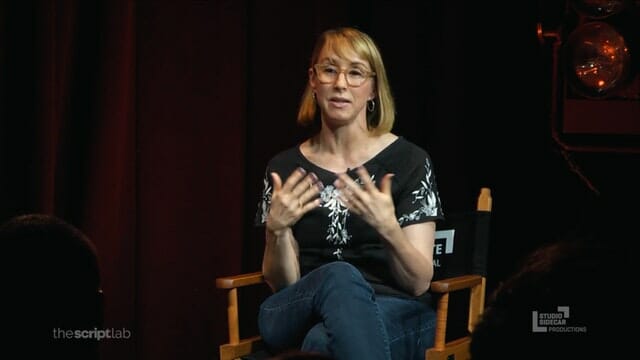
Kira Snyder is an Emmy-winning writer and producer, whose television credits include The 100 (CW), The Handmaid's Tale (Hulu), Alphas (SyFy), and Eureka (SyFy). She was also a screenwriter on Steven S. DeKnight's film Pacific Rim: Uprising .
Kira worked as the co-producer of The 100 for three seasons and also wrote five episodes of the series. On The Handmaid's Tale , Kira worked as a supervising producer for ten episodes and worked as an executive story editor for thirteen episodes on Alphas and Eureka .
In her interview on TSL 360, Kira talks about getting into television after first having a separate career in gaming.
00:49-2:56 "Screenwriting is actually kind of my second main career. I mention that because there are people listening who may be thinking about a career change. It can be challenging, but you can do it. I was a drama major in college. I wrote plays… and learned very quickly that it's very difficult to make a living as a playwright—that theater is a very hard business to make a living at! And at the same time I was doing that, I was playing a lot of OG computer games, like text-based, multi-user games. The games that would turn into Everquest and Minecraft… and I took this left turn into technology. I went to graduate school at NYU for Interactive Telecommunications, where I focused on computer game design. So I worked in the computer game industry for ten years… doing online games, specifically world-building games. So probably world-building has been the common thread of my career, from theatre to games to now screenwriting…
The most recent job that I had in that was for Yahoo. It was a great company, but the games I was working on personally were not quite what I got into the business to do; they were lightweight, casual games like Bejeweled and Candy Crush… nothing narrative, or story driven. So that was a job that moved me down to Los Angeles. And I will say, to be in TV, you really do need to be in Los Angeles.
I was here [in LA] working at Yahoo and I got into the Warner Bros. Drama Writers' Workshop, which I highly recommend. It's a great, great program. From that, I got staffed on my first show, which was the CBS vampire detective show Moonlight —one season wonder! But that was my first job in the industry… I gave Yahoo two weeks notice, and I started focusing on screenwriting ever since."
In Kira's interview: Hear about Kira's experience in the writers' room, and how she and the other writers break story on the hit Hulu show The Handmaid's Tale .
2. VIDEO: BEN CORY JONES, TELEVISION WRITER/PRODUCER 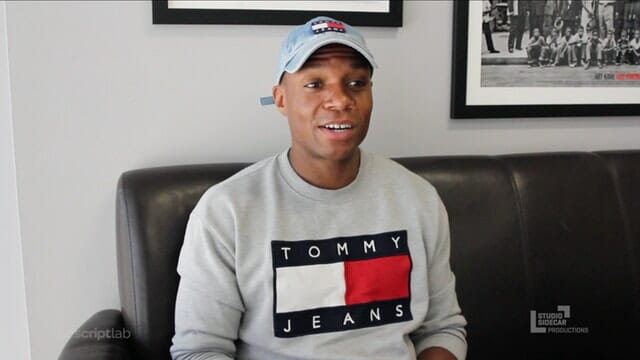
Ben Cory Jones is currently the Showrunner/Executive Producer of the upcoming BET comedy series, Boomerang , loosely based on the iconic 90s film starring Eddie Murphy and Halle Berry. Producing partner Lena Waithe and Halle Berry also serve as executive producers. Previously, Ben produced a feature film, Step Sisters , with Lena Waithe, which is streaming on Netflix. Ben also created and wrote a drama series, Candy , which is currently in development at Universal Cable Productions.
In his exclusive interview on TSL 360, Ben dives deep into his personal background, explores breaking into television after first working on Wall Street, and how the multitude of jobs he held while working his way toward being a TV writer helped him get where he is today.
00:25-14:10 "I'm originally from Memphis, TN… I was raised by a single father. My mother passed away of cancer when I was seven years old. So, before my mother passed away, she always ingrained in me about the importance of reading and literature… and very serendipitously… left me this great bookshelf of books that she had read throughout her lifetime… So me being a writer and a reader was very much a part of who I was growing up. So I wouldn't necessarily say I always wanted to be a screenwriter, but I knew that the written word unlocked something in my imagination for me that helped me heal from the wounds of losing my mom…
I went to Morehouse College undergrad in Atlanta, GA… and when I graduated from college, my first job was with an investment banker in New York City on Wall Street. My father strongly encouraged me to get a degree in finance also… I worked that job for three years… then the great market crash of 2008 happened, and we were all out of jobs…It was that moment in my life when I realized that I really needed to figure out what it is that I really, really want to do, and I think that's what took me back to my literature background.
…You know, just to be very honest, I was going through a breakup at the time, my job was now going away, so I went down to NYU at Union Square, because I figured I'd just take an after-work sort of class, as a hobby… And I picked up the NYU course catalogue, and I saw, you know, very serendipitously, my finger stopped on the page that said 'TV writing.' And I was like, huh, Grey's Anatomy had just hit, The Sopranos was on, Lost was on, Desperate Housewives was on; these were shows that had me glued to my television… and then I did the research. Those little names you see scrolling across the screen, these were all writers… this is a career that people have. So I paid my $700 for the class… and I'll never forget it, literally one hour into my being in that class… I had that 'Aha' moment… 'this is it!'
…I spent a lot of time in NYC just writing, writing spec scripts, writing pilots, part of my class assignments. My professor at the time… was like, 'Look, if you want to do this for a living, you have to move to LA."… I looked into any kind of program I could get into in LA… but as we all know, the writers' programs with the studios, they're just very hard to get into. And so I applied to a program at ABC Studios called the Production Associates Program. They no longer have this program, but it was a phenomenal program because you were basically applying to be a floater assistant inside the production department of ABC Studios… you can go be in development as an assistant one day… and be in casting one day… and so I applied to that program and got in. I took a 90% pay cut to do the job… I basically had my grad school.
While I was there, I didn't immediately tell people I wanted to be a writer, because they were grooming us to become production executives. However, and this is one of the things I learned along the way, you really have to open your mouth and tell people what you want to do, otherwise, they can't help you. After I settled in for a month or two, I started telling people, you know, I really wanna be a writer… when I did that, people started to give me advice. Or 'let me read your pilot… consider taking this class, go this seminar, go to this networking event… I finally found the courage in myself to say, 'You know what? I'm a writer.' And once you've found that courage, you'd be surprised how much unlocks for you.
I always had my sights set on getting into ABC's writing program… now the challenge is, it took me four years in a row to apply to get in that program… for me in LA from year one to year four, I was just working at whatever jobs I could find… every year I was constantly writing… constantly writing new spec scripts… Interestingly enough, there was a show at ABC Family, now Freeform, called Chasing Life … about a 20-something year old girl who gets diagnosed with cancer. So given that I've experienced this in my life… I knew that was a show I wanted to write for… so I lobbied—'I wanna write on this show.' It's not easy being a staff writer on a show. And if you as a staff writer… have a personal connection to the material, at the end of the day, you may not be the best writer, you may not be the best person to pitch a story in the room, but you can at least speak to your own personal experience…so my first staffing was on that ABC Family show, which was a phenomenal experience… but before I got that staffing gig, I worked probably about three to four years as a writers' assistant, script coordinator, writers' PA… Even now when I'm showrunning this show, there are pretty much no jobs that I've never had myself."
In Ben's interview: Learn what special qualities Ben looks for when hiring writers for his writers' room.
3. VIDEO: CATHRYN HUMPHRIS, TV SCREENWRITER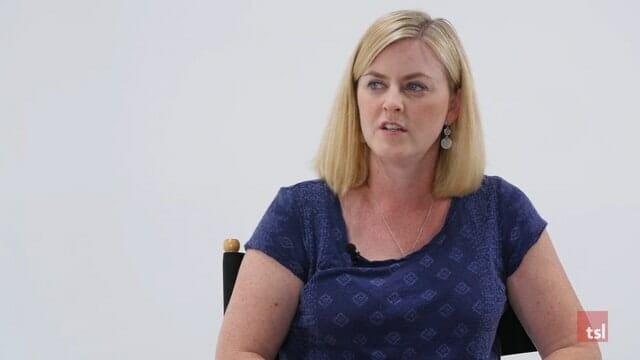
Cathryn Humphris is a producer and WGA Award-Winning writer known for her work on Mad Men , Elementary , NCIS: New Orleans , Under the Dome , and Supernatural .
In her interview on TSL 360, Cathryn talks in detail about the 'assistant route' she took to break into the business, and her experiences working on various shows throughout the years.
00:21-6:30 "I have been writing for television for about eleven or twelve years now, but I've actually been in the business for dangerously close to twenty. I came out straight after college. I grew up in a small town called Chattanooga, TN. And then I went to Northwestern University, and then came out here [to Los Angeles] right after, and started working in the film and TV business… I knew that I always wanted to write, which when you're growing up in a small town in Tennessee, nobody wants to hear that. So I told people I wanted to be a journalist, because I didn't think anyone would be supportive of me wanting to write.
…I came out [to LA] in the late 90s. It was right before the Golden Age of Television, and I think I thought I wanted to be a writer and director for film, but I didn't tell anyone that. I picked Northwestern because they had a very strong academic department, and also a film department. You didn't have to have a reel or anything to get in. So once I got to Northwestern, I finally told people that [film] was what I wanted to do, so I did an internship out here [in LA] and for the first year and a half, I think, I was working toward the film world.
And then a friend of mine who'd actually been my RA [resident assistant] in college and was now running Criminal Minds , said, 'Hey, you should check out this TV thing; it's way more stable." I said, 'Stable sounds good.' He also said, 'I know you don't just want to write, you want to be involved at all levels, and in movies, you tend to write and a million people take it over, and you don't have anything to do with it. But in TV, you produce your work.' That sounded good to me; I didn't really know what I was doing.
…There's a million ways to break in; I went the assistant route… I went assistant job to assistant job… The first show I worked on was called Once and Again for Ed Zwick and Marshall Herskovitz, who had done Thirtysomething and My So-Called Life , and I was a huge fan of theirs…I was super lucky to get my first job as a PA for them… They let me be involved in any aspect, I could go into any department, sit down, say 'tell me about what you're doing.' I could go down on set… I did that for a season as a PA, basically getting coffee, getting lunch. And then the next season, I knew that I wanted to do writing; I came back and they made me the writers' assistant, which was awesome.
Except the thing about Ed and Marshall's shows, at least at that time, is that they didn't really have a writers' room. So there was sort of a limit to what I could learn. I was working closely with the writers, but a lot of what they were doing was one-on-one meetings with Ed and Marshall, and then working from home. So I did that for the second season, and then, bizarrely, my next job was working for Gillian Anderson… She moved to London when the series [ The X-Files ] was over, and asked me to move to London with her. And at that point, I thought 'If I'm gonna write, I need to get serious about this.' So I applied for something called the Warner Bros. Writers' Program.
…I worked a couple of other jobs, I worked for Worldwide Pants in development… I did the WB Writers' Program, but I didn't get staffed out of that, but I ended up as a Writers' Assistant on a show called Supernatural , which a year and a half later, would ultimately be my first staff job. So I got a lot of coffee for a lot of people, and eventually, it paid off."
In Cathryn's interview: Hear Carolyn's sage advice for first-time writers in a writers' room.
4. VIDEO: WENDY CALHOUN, TV WRITER/SHOWRUNNER/PRODUCER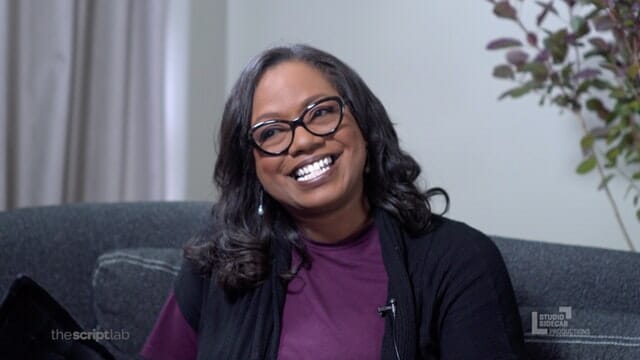
Wendy Calhoun is a WGA and Peabody Award-nominated writer, and currently a consulting producer for Station 19 , the Grey's Anatomy firefighter spin-off produced by Shondaland and ABC. Her past credits include co-executive producing and writing the historic first season of Fox's huge hit TV show Empire , as well as writing and producing for Nashville (ABC), Justified (FX), Revenge (ABC), and Life (NBC). She has also created and developed pilots with ABC Signature, FX, 20th TV, Fox, and Netflix. Born and raised in Dallas, TX, Wendy studied film and television at New York University's Tisch School of the Arts.
In her interview on TSL 360, Wendy discusses her background in theatre, how her past life experience made her a better producer, and major changes that have been happening in the industry for writers over the last few years.
00:29-3:03 "I got into writing for television by writing plays. I was at the performing arts high school in Dallas, TX, and there I started acting, but my sophomore year, I was interested in playwriting… so I wrote my first play… and it was produced! And I was really excited about that, and the minute I saw people saying my words, it was a life-changing moment for me… I would go and write more and more plays, my plays got some recognition. I went to New York University, and studied at Playwright's Horizons my first year and met a lot of great playwrights. My sophomore year, I moved into the film and television department, and that's where I started making my first films.
And when I moved out to Hollywood, I had this idea that I wanted to run a network! I don't know, that was just my idea straight out of college. And so I started working my way up from an assistant up to becoming a development executive, and working with literary agents, and developing people. And that meant I got to read a lot of scripts. That was a great education, actually. I just studied other people's writing. In the meantime, I was still writing plays, still writing my pieces.
Finally, I had gotten the opportunity to write for a non-scripted program; it was for Animal Planet. And it led to seven years of me writing and producing documentary television—'non-scripted!' And I thought, "Well, I love television, maybe I should take that love of plays and write one-hour drama." So I started writing specs in one-hour drama. Two years into that process, I found a manager who appreciated my work, and for five years went knocking on doors in Hollywood. Finally, finally, somebody said, "Yes." And that started my drama writing career."
In Wendy's interview: Discover how Wendy's extensive producing experience in the non-scripted/reality realm helps her greatly as a producer in scripted television, and concrete ways to help get into a writers' room.
5. VIDEO: BRITTA LUNDIN, TELEVISION WRITER/AUTHOR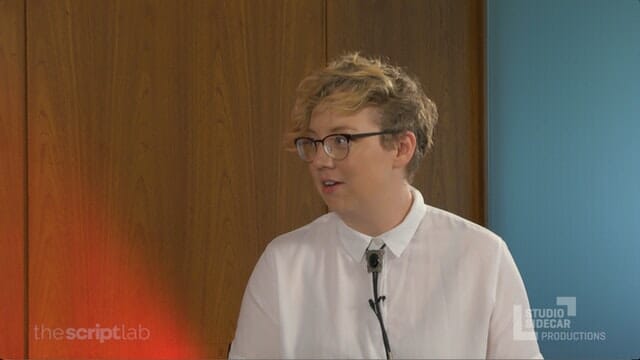
Britta Lundin is a TV writer, novelist, and comic book writer. She writes for Riverdale on CW. Her young adult novel, Ship It , about fan fiction, Comic-Con, and wanting more from the TV shows you love is now out from Freeform Books. Originally from the Pacific Northwest, Britta now lives with her wife and their lime tree in Los Angeles.
In her interview on TSL 360, Britta discusses her love for fan fiction and how that passion led her to write the screenplay that opened doors and changed her life.
00:47-3:10 "I had written many scripts that started me down the path of being a good enough screenwriter to be a screenwriter. And I would show them to my friends, and they would sort of say, "You know, I can see where you're going, but I don't really feel 'Britta' in this script. I don't really feel, like, who you are.' And so I'd dive a little deeper, write something a little different, write something over here, try out a couple different genres, and then finally I thought, "Well, maybe I'll write a screenplay about something I have a lot of personal experience with—which is reading gay fan fiction on the internet. And I was like, "No, Britta, you can't write a screenplay about reading gay fan fiction on the internet. Like, you don't want to be spreading your dirty laundry that way'… but it's something that I happen to be very passionate about. So I wrote a script about a girl who writes a lot of gay fan fiction about her favorite TV show… I wrote this screenplay thinking that for twelve people on the internet, it would be their favorite thing ever, and that most of Hollywood would be, like, I don't really care.
But my friends were like, 'Britta, I think you've finally done it—you've written something that has you in it!'… And it started getting a little attention, and it won a few awards, and people were reading it and being like, 'I'm gonna pass this along, I like it so much.' And eventually I got my agent from that script; it was my writing sample for Riverdale , and I got staffed on Riverdale , and not long after getting staffed on Riverdale , I sold it as a young adult novel and it just came out this year. So basically, I was terrified to write that one screenplay and then everything good came because of it."
In Britta's interview: Hear about Britta's pitching technique that she uses in the writers' room to work successfully with her showrunner.
Sign up for TSL 360 to watch these full-length interviews, plus more from our collection of 80+ industry pros.Try for FREE for 3 days!
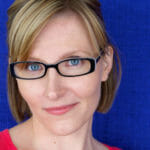 Rebecca Norris is a producer, writer, and filmmaker with her production company, Freebird Entertainment. Her recent award-winning feature film, Cloudy With a Chance of Sunshine, has been distributed on Amazon Streaming and DVD. Rebecca is also a script analyst and consultant who has read for many companies, including Sundance, ScreenCraft, Bluecat, and the International Emmys, as well as her own script consultancy, Script Authority. Rebecca blogs for Screencraft, The Script Lab, WeScreenplay and Script Magazine, exploring the film writing and production process and encouraging writers to produce their own work. Follow Rebecca's posts on Twitter at @beckaroohoo!
Rebecca Norris is a producer, writer, and filmmaker with her production company, Freebird Entertainment. Her recent award-winning feature film, Cloudy With a Chance of Sunshine, has been distributed on Amazon Streaming and DVD. Rebecca is also a script analyst and consultant who has read for many companies, including Sundance, ScreenCraft, Bluecat, and the International Emmys, as well as her own script consultancy, Script Authority. Rebecca blogs for Screencraft, The Script Lab, WeScreenplay and Script Magazine, exploring the film writing and production process and encouraging writers to produce their own work. Follow Rebecca's posts on Twitter at @beckaroohoo!
For all the latest from The Script Lab, be sure to follow us on Twitter, Facebook, and Instagram.
How To Get Into Writing For Tv
Source: https://thescriptlab.com/features/screenwriting-101/9730-5-ways-to-break-in-as-a-tv-writer/
Posted by: eppsuporly.blogspot.com

0 Response to "How To Get Into Writing For Tv"
Post a Comment